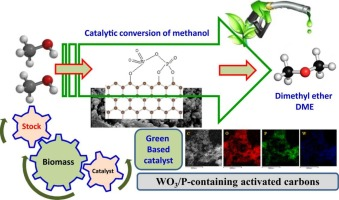The current environmental situation has urged researchers to look for alternative green fuels with lower emissions from biomass feedstock. This work aims a greener approach for the heterogeneous catalytic conversion of methanol to dimethyl ether, DME, as an alternative fuel. Thus, a series of phosphorous−containing activated carbon (ACP) derived from orange peel (OP) at different H3PO4: OP (w/w) rations, as well as a series of tungsten (W)-loaded on ACP, WO3/ACP supported catalysts were formed and thermally treated at different temperatures. The formed materials were characterized by XRD, ATR−FTIR, N2 adsorption/desorption, HRTEM, electron diffraction, EDX, elemental mapping and surface acidity. Effects of H3PO4 ratio and treatment temperature on the bulk and surface properties of the produced catalyst/support materials were investigated. Catalytic activities of the ACP support and W-loaded catalysts towards methanol dehydration in the range of 150–400 °C were measured at WHSV of 2.01 h−1 in an inert atmosphere. Improved catalytic performance was observed for ACP support, which further improved for the W-loaded catalysts. This involved increase of methanol conversion (from 67% to 84%), DME formation rate (from 14.6 to 18.3 mmol.h−1), time-on-stream (from < 40 to >120 h) and Ea (from 48.98 to 42.23 kJ mol−1) on moving from ACP support to the most active supported catalyst, respectively. The improvement was attributed to the enhanced textural and thermal stability of the supported catalyst, which places it among the high efficiency catalysts for DME formation.


